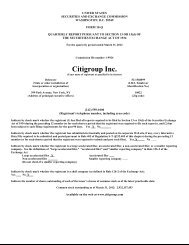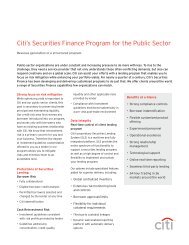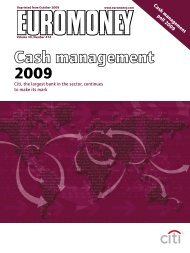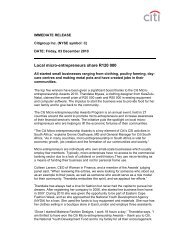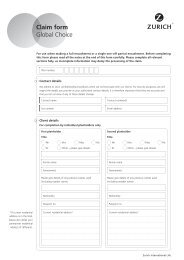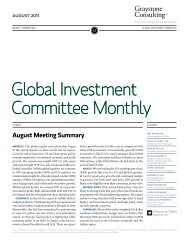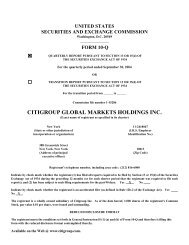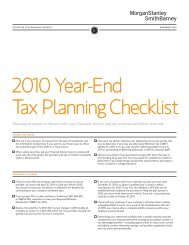<strong>Citigroup</strong> remains subject to restrictions on its ability topay common stock dividends and to redeem or repurchase<strong>Citigroup</strong> equity or trust preferred securities for so longas its trust preferred securities continue to be held by theU.S government.Pursuant to its agreements with certain U.S. government entities, dated June 9,2009, executed in connection with Citi’s exchange offers consummated inJuly and September 2009, <strong>Citigroup</strong> remains subject to dividend and sharerepurchase restrictions for so long as the U.S. government continues to holdany <strong>Citigroup</strong> trust preferred securities acquired in connection with theexchange offers. These restrictions, subject to certain exceptions, generallyprohibit <strong>Citigroup</strong> from paying regular cash dividends in excess of $0.01 pershare of common stock per quarter or from redeeming or repurchasing any<strong>Citigroup</strong> equity securities or trust preferred securities. As of December 31, 2010,approximately $3.025 billion of trust preferred securities issued to the FDICremains outstanding (of which approximately $800 million is being held forthe benefit of the U.S. Treasury). In addition, even if <strong>Citigroup</strong> were no longercontractually bound by the dividend and share purchase restrictions of theseagreements, any decision by <strong>Citigroup</strong> to pay common stock dividends orinitiate a share repurchase will be subject to further regulatory approval.Citi could be harmed competitively if it is unable to hireor retain qualified employees as a result of regulatoryuncertainty regarding compensation practices or otherwise.<strong>Citigroup</strong>’s performance and competitive standing is heavily dependent onthe talents and efforts of the highly skilled individuals that it is able to attractand retain, including without limitation in its S&B business. Competitionfor such individuals within the financial services industry has been, and willlikely continue to be, intense.Compensation is a key element of attracting and retaining highlyqualified employees. Banking regulators in the U.S., European Union andelsewhere are in the process of developing principles, regulations and otherguidance governing what are deemed to be sound compensation practicesand policies, and the outcome of these processes is uncertain. In addition,compensation for certain employees of financial institutions, such asbankers, continues to be a legislative focus both in Europe and in the U.S.Changes required to be made to the compensation policies andpractices of <strong>Citigroup</strong>, or those of the banking industry generally, mayhinder Citi’s ability to compete in or manage its businesses effectively, toexpand into or maintain its presence in certain businesses and regions,or to remain competitive in offering new financial products and services.This is particularly the case in emerging markets, where <strong>Citigroup</strong> is oftencompeting for qualified employees with other financial institutions that seekto expand in these markets. Moreover, new disclosure requirements mayresult from the worldwide regulatory processes described above. If this wereto occur, Citi could be required to make additional disclosures relating to thecompensation of its employees in a manner that creates competitive harmthrough the disclosure of previously confidential information, or throughthe direct or indirect new disclosures of the identity of certain employeesand their compensation. Any such additional public disclosure of employeecompensation, or any future legislation or regulation that requires <strong>Citigroup</strong>to restrict or modify its compensation policies, could hurt Citi’s ability to hire,retain and motivate its key employees and thus harm it competitively.<strong>Citigroup</strong> is subject to a significant number of legal andregulatory proceedings that are often highly complex, slowto develop and are thus difficult to predict or estimate.At any given time, <strong>Citigroup</strong> is defending a significant number of legaland regulatory proceedings, and the volume of claims and the amount ofdamages and penalties claimed in litigation, arbitration and regulatoryproceedings against financial institutions generally remain high.Proceedings brought against Citi may result in judgments, settlements, fines,penalties, injunctions, business improvement orders, or other results adverseto it, which could materially and negatively affect <strong>Citigroup</strong>’s businesses,financial condition or results of operations, require material changes inCiti’s operations, or cause <strong>Citigroup</strong> reputational harm. Moreover, the manylarge claims asserted against Citi are highly complex and slow to develop,and they may involve novel or untested legal theories. The outcome of suchproceedings may thus be difficult to predict or estimate until late in theproceedings, which may last several years. Although <strong>Citigroup</strong> establishesaccruals for its litigation and regulatory matters according to accountingrequirements, the amount of loss ultimately incurred in relation to thosematters may be substantially higher or lower than the amounts accrued.In addition, while Citi seeks to prevent and detect employee misconduct,such as fraud, employee misconduct is not always possible to deter orprevent, and the extensive precautions <strong>Citigroup</strong> takes to prevent and detectthis activity may not be effective in all cases, which could subject Citi toadditional liability. Moreover, the so-called “whistle-blower” provisions ofthe Financial Reform Act, which apply to all corporations and other entitiesand persons, provide substantial financial incentives for persons to reportalleged violations of law to the SEC and the Commodity Futures TradingCommission. These provisions could increase the number of claims that<strong>Citigroup</strong> will have to investigate or against which <strong>Citigroup</strong> will have todefend itself, and may otherwise further increase <strong>Citigroup</strong>’s legal liabilities.For additional information relating to <strong>Citigroup</strong>’s potential exposurerelating to legal and regulatory matters, see Note 29 to the ConsolidatedFinancial Statements.The Financial Accounting Standards Board (FASB) iscurrently reviewing or proposing changes to several keyfinancial accounting and reporting standards utilized byCiti which, if adopted as proposed, could have a materialimpact on how <strong>Citigroup</strong> records and reports its financialcondition and results of operations.The FASB is currently reviewing or proposing changes to several of thefinancial accounting and reporting standards that govern key aspects of<strong>Citigroup</strong>’s financial statements. While the outcome of these reviews andproposed changes is uncertain and difficult to predict, certain of thesechanges could have a material impact on how <strong>Citigroup</strong> records andreports its financial condition and results of operations, and could hinder78
understanding or cause confusion across comparative financial statementperiods. For example, the FASB’s financial instruments and balance sheetoffsetting projects could, among other things, significantly change how<strong>Citigroup</strong> classifies, measures and reports financial instruments, determinesthe impairment on those assets, accounts for hedges, and determines whenassets and liabilities may be offset. In addition, the FASB’s leasing projectcould eliminate most operating leases and instead capitalize them, whichwould result in a gross-up of Citi’s balance sheet and a change in the timingof income and expense recognition patterns for leases.Moreover, the FASB continues its convergence project with theInternational Accounting Standards Board (IASB) pursuant to which U.S.GAAP and International Financial Reporting Standards (IFRS) are to beconverged. The FASB and IASB continue to have significant disagreements onthe convergence of certain key standards affecting Citi’s financial reporting,including accounting for financial instruments and hedging. In addition,the SEC has not yet determined whether, or when, U.S. companies will berequired to adopt IFRS. There can be no assurance that the transition toIFRS, if and when required to be adopted by Citi, will not have a materialimpact on how Citi reports its financial results, or that Citi will be able tomeet any transition timeline so adopted.<strong>Citigroup</strong>’s financial statements are based in part onassumptions and estimates, which, if wrong, could causeunexpected losses in the future, sometimes significant.Pursuant to U.S. GAAP, <strong>Citigroup</strong> is required to use certain assumptions andestimates in preparing its financial statements, including in determiningcredit loss reserves, reserves related to litigation and regulatory exposures,mortgage representation and warranty claims and the fair value of certainassets and liabilities, among other items. If the assumptions or estimatesunderlying <strong>Citigroup</strong>’s financial statements are incorrect, <strong>Citigroup</strong> mayexperience significant losses. For additional information on the key areasfor which assumptions and estimates are used in preparing Citi’s financialstatements, see “Significant Accounting Policies and Significant Estimates”below, and for further information relating to litigation and regulatoryexposures, see Note 29 to the Consolidated Financial Statements.<strong>Citigroup</strong> may incur significant losses as a result ofineffective risk management processes and strategies, andconcentration of risk increases the potential for such losses.<strong>Citigroup</strong> seeks to monitor and control its risk exposure across businesses,regions and critical products through a risk and control frameworkencompassing a variety of separate but complementary financial, credit,operational, compliance and legal reporting systems, internal controls,management review processes and other mechanisms. While <strong>Citigroup</strong>employs a broad and diversified set of risk monitoring and risk mitigationtechniques, those techniques and the judgments that accompany theirapplication may not be effective and may not anticipate every economic andfinancial outcome in all market environments or the specifics and timing ofsuch outcomes. Market conditions over the last several years have involvedunprecedented dislocations and highlight the limitations inherent in usinghistorical data to manage risk.Concentration of risk increases the potential for significant losses. Becauseof concentration of risk, <strong>Citigroup</strong> may suffer losses even when economic andmarket conditions are generally favorable for <strong>Citigroup</strong>’s competitors. Theseconcentrations can limit, and have limited, the effectiveness of <strong>Citigroup</strong>’shedging strategies and have caused <strong>Citigroup</strong> to incur significant losses,and they may do so again in the future. In addition, <strong>Citigroup</strong> extends largecommitments as part of its credit origination activities. <strong>Citigroup</strong>’s inabilityto reduce its credit risk by selling, syndicating or securitizing these positions,including during periods of market dislocation, could negatively affect itsresults of operations due to a decrease in the fair value of the positions, aswell as the loss of revenues associated with selling such securities or loans.Although <strong>Citigroup</strong>’s activities expose it to the credit risk of many differententities and counterparties, <strong>Citigroup</strong> routinely executes a high volume oftransactions with counterparties in the financial services sector, includingbanks, other financial institutions, insurance companies, investment banksand government and central banks. This has resulted in significant creditconcentration with respect to this sector. To the extent regulatory or marketdevelopments lead to an increased centralization of trading activity throughparticular clearing houses, central agents or exchanges, this could increase<strong>Citigroup</strong>’s concentration of risk in this sector.A failure in <strong>Citigroup</strong>’s operational systems orinfrastructure, or those of third parties, could impair itsliquidity, disrupt its businesses, result in the disclosure ofconfidential information, damage <strong>Citigroup</strong>’s reputationand cause losses.<strong>Citigroup</strong>’s businesses are highly dependent on their ability to process andmonitor, on a daily basis, a very large number of transactions, many ofwhich are highly complex, across numerous and diverse markets in manycurrencies. These transactions, as well as the information technology services<strong>Citigroup</strong> provides to clients, often must adhere to client-specific guidelines,as well as legal and regulatory standards. Due to the breadth of <strong>Citigroup</strong>’sclient base and its geographical reach, developing and maintaining<strong>Citigroup</strong>’s operational systems and infrastructure is challenging,particularly as a result of rapidly evolving legal and regulatory requirementsand technological shifts. <strong>Citigroup</strong>’s financial, account, data processing orother operating systems and facilities may fail to operate properly or becomedisabled as a result of events that are wholly or partially beyond its control,such as a spike in transaction volume, cyberattack or other unforeseencatastrophic events, which may adversely affect <strong>Citigroup</strong>’s ability to processthese transactions or provide services.In addition, <strong>Citigroup</strong>’s operations rely on the secure processing, storageand transmission of confidential and other information on its computersystems and networks. Although <strong>Citigroup</strong> takes protective measures tomaintain the confidentiality, integrity and availability of Citi’s and its clients’information across all geographic and product lines, and endeavors tomodify these protective measures as circumstances warrant, the nature ofthe threats continues to evolve. As a result, <strong>Citigroup</strong>’s computer systems,software and networks may be vulnerable to unauthorized access, loss ordestruction of data (including confidential client information), account79
- Page 1 and 2:
UNITED STATESSECURITIES AND EXCHANG
- Page 3 and 4:
CITIGROUP’S 2010 ANNUAL REPORT ON
- Page 5 and 6:
As described above, Citigroup is ma
- Page 7 and 8: Operating ExpensesCitigroup operati
- Page 9 and 10: FIVE-YEAR SUMMARY OF SELECTED FINAN
- Page 11 and 12: CITIGROUP REVENUESIn millions of do
- Page 13 and 14: REGIONAL CONSUMER BANKINGRegional C
- Page 15 and 16: 2009 vs. 2008Revenues, net of inter
- Page 17 and 18: 2009 vs. 2008Revenues, net of inter
- Page 19 and 20: 2009 vs. 2008Revenues, net of inter
- Page 21 and 22: 2009 vs. 2008Revenues, net of inter
- Page 23 and 24: SECURITIES AND BANKINGSecurities an
- Page 25 and 26: TRANSACTION SERVICESTransaction Ser
- Page 27 and 28: BROKERAGE AND ASSET MANAGEMENTBroke
- Page 29 and 30: Japan Consumer FinanceCitigroup con
- Page 31 and 32: The following table provides detail
- Page 33 and 34: CORPORATE/OTHERCorporate/Other incl
- Page 35 and 36: During 2010, average Consumer loans
- Page 37 and 38: SEGMENT BALANCE SHEET AT DECEMBER 3
- Page 39 and 40: Citigroup Regulatory Capital Ratios
- Page 41 and 42: Capital Resources of Citigroup’s
- Page 43 and 44: Regulatory Capital Standards Develo
- Page 45 and 46: DepositsCiti continues to focus on
- Page 47 and 48: Secured financing is primarily cond
- Page 49 and 50: Each of the credit rating agencies
- Page 51 and 52: RISK FACTORSThe ongoing implementat
- Page 53 and 54: The emerging markets in which Citi
- Page 55 and 56: is largely uncertain. However, any
- Page 57: a short-term Liquidity Coverage Rat
- Page 61 and 62: MANAGING GLOBAL RISKRISK MANAGEMENT
- Page 63 and 64: CREDIT RISKCredit risk is the poten
- Page 65 and 66: [This page intentionally left blank
- Page 67 and 68: (1) 2010 primarily includes an addi
- Page 69 and 70: Non-Accrual Loans and AssetsThe tab
- Page 71 and 72: Renegotiated LoansThe following tab
- Page 73 and 74: Citi’s first mortgage portfolio i
- Page 75 and 76: Consumer Mortgage FICO and LTVData
- Page 77 and 78: Second Mortgages: December 31, 2010
- Page 79 and 80: Interest Rate Risk Associated with
- Page 81 and 82: North America Cards—FICO Informat
- Page 83 and 84: CONSUMER LOAN DETAILSConsumer Loan
- Page 85 and 86: Consumer Loan Modification Programs
- Page 87 and 88: North America CardsNorth America ca
- Page 89 and 90: Payment deferrals that do not conti
- Page 91 and 92: Repurchase ReserveCiti has recorded
- Page 93 and 94: Securities and Banking-Sponsored Pr
- Page 95 and 96: The following table presents the co
- Page 97 and 98: MARKET RISKMarket risk encompasses
- Page 99 and 100: Trading PortfoliosPrice risk in tra
- Page 101 and 102: INTEREST REVENUE/EXPENSE AND YIELDS
- Page 103 and 104: AVERAGE BALANCES AND INTEREST RATES
- Page 105 and 106: ANALYSIS OF CHANGES IN INTEREST EXP
- Page 107 and 108: [This page intentionally left blank
- Page 109 and 110:
As required by SEC rules, the table
- Page 111 and 112:
The credit valuation adjustment amo
- Page 113 and 114:
The fair values shown are prior to
- Page 115 and 116:
Key Controls over Fair Value Measur
- Page 117 and 118:
The following table reflects the in
- Page 119 and 120:
The results of the July 1, 2010 tes
- Page 121 and 122:
As a result of the losses incurred
- Page 123 and 124:
MANAGEMENT’S ANNUAL REPORT ON INT
- Page 125 and 126:
• an “ownership change” under
- Page 127 and 128:
REPORT OF INDEPENDENT REGISTERED PU
- Page 129 and 130:
FINANCIAL STATEMENTS AND NOTES TABL
- Page 131 and 132:
CONSOLIDATED FINANCIAL STATEMENTSCO
- Page 133 and 134:
CONSOLIDATED BALANCE SHEET(Continue
- Page 135 and 136:
CONSOLIDATED STATEMENT OF CHANGES I
- Page 137 and 138:
CITIBANK CONSOLIDATED BALANCE SHEET
- Page 139 and 140:
NOTES TO CONSOLIDATED FINANCIAL STA
- Page 141 and 142:
Repurchase and Resale AgreementsSec
- Page 143 and 144:
ecoveries are added. Securities rec
- Page 145 and 146:
Consumer Mortgage Representations a
- Page 147 and 148:
Transfers of Financial AssetsFor a
- Page 149 and 150:
ACCOUNTING CHANGESChange in Account
- Page 151 and 152:
The following table reflects the in
- Page 153 and 154:
Measuring Liabilities at Fair Value
- Page 155 and 156:
Revisions to the Earnings-per-Share
- Page 157 and 158:
FUTURE APPLICATION OF ACCOUNTING ST
- Page 159 and 160:
3. DISCONTINUED OPERATIONSSale of T
- Page 161 and 162:
CitiCapitalOn July 31, 2008, Citigr
- Page 163 and 164:
5. INTEREST REVENUE AND EXPENSEFor
- Page 165 and 166:
Stock Award ProgramsCitigroup issue
- Page 167 and 168:
In January 2009, members of the Man
- Page 169 and 170:
Information with respect to stock o
- Page 171 and 172:
9. RETIREMENT BENEFITSThe Company h
- Page 173 and 174:
The following table shows the chang
- Page 175 and 176:
A one-percentage-point change in th
- Page 177 and 178:
Level 3 Roll ForwardThe reconciliat
- Page 179 and 180:
10. INCOME TAXESIn millions of doll
- Page 181 and 182:
The Company is currently under audi
- Page 183 and 184:
11. EARNINGS PER SHAREThe following
- Page 185 and 186:
13. BROKERAGE RECEIVABLES AND BROKE
- Page 187 and 188:
The table below shows the fair valu
- Page 189 and 190:
Debt Securities Held-to-MaturityThe
- Page 191 and 192:
Evaluating Investments for Other-Th
- Page 193 and 194:
The following is a 12-month roll-fo
- Page 195 and 196:
16. LOANSCitigroup loans are report
- Page 197 and 198:
Residential Mortgage Loan to Values
- Page 199 and 200:
The following table presents Corpor
- Page 201 and 202:
Included in the Corporate and Consu
- Page 203 and 204:
18. GOODWILL AND INTANGIBLE ASSETSG
- Page 205 and 206:
Intangible AssetsThe components of
- Page 207 and 208:
CGMHI has committed long-term finan
- Page 209 and 210:
20. Regulatory CapitalCitigroup is
- Page 211 and 212:
22. SECURITIZATIONS AND VARIABLE IN
- Page 213 and 214:
In millions of dollars As of Decemb
- Page 215 and 216:
Funding Commitments for Significant
- Page 217 and 218:
Credit Card SecuritizationsThe Comp
- Page 219 and 220:
Managed Loans—Citi HoldingsThe fo
- Page 221 and 222:
Key assumptions used in measuring t
- Page 223 and 224:
Mortgage Servicing RightsIn connect
- Page 225 and 226:
The Company administers one conduit
- Page 227 and 228:
Key Assumptions and Retained Intere
- Page 229 and 230:
Municipal InvestmentsMunicipal inve
- Page 231 and 232:
Derivative NotionalsIn millions of
- Page 233 and 234:
activities together with gains and
- Page 235 and 236:
Cash Flow HedgesHedging of benchmar
- Page 237 and 238:
The range of credit derivatives sol
- Page 239 and 240:
24. CONCENTRATIONS OF CREDIT RISKCo
- Page 241 and 242:
Trading account assets and liabilit
- Page 243 and 244:
The internal valuation techniques u
- Page 245 and 246:
In millions of dollars at December
- Page 247 and 248:
Changes in Level 3 Fair Value Categ
- Page 249 and 250:
In millions of dollarsDecember 31,2
- Page 251 and 252:
26. FAIR VALUE ELECTIONSThe Company
- Page 253 and 254:
The following table provides inform
- Page 255 and 256:
Certain structured liabilitiesThe C
- Page 257 and 258:
28. PLEDGED SECURITIES, COLLATERAL,
- Page 259 and 260:
The repurchase reserve estimation p
- Page 261 and 262:
CollateralCash collateral available
- Page 263 and 264:
29. CONTINGENCIESOverviewIn additio
- Page 265 and 266:
pursuant to which Citigroup agreed
- Page 267 and 268:
court filings under docket number 0
- Page 269 and 270:
30. CITIBANK, N.A. STOCKHOLDER’S
- Page 271 and 272:
Condensed Consolidating Statements
- Page 273 and 274:
Condensed Consolidating Statements
- Page 275 and 276:
Condensed Consolidating Balance She
- Page 277 and 278:
Condensed Consolidating Statements
- Page 279 and 280:
33. SELECTED QUARTERLY FINANCIAL DA
- Page 281 and 282:
SUPERVISION AND REGULATIONCitigroup
- Page 283 and 284:
Citigroup continues to evaluate its
- Page 285 and 286:
CORPORATE INFORMATIONCITIGROUP EXEC
- Page 287 and 288:
SignaturesPursuant to the requireme



